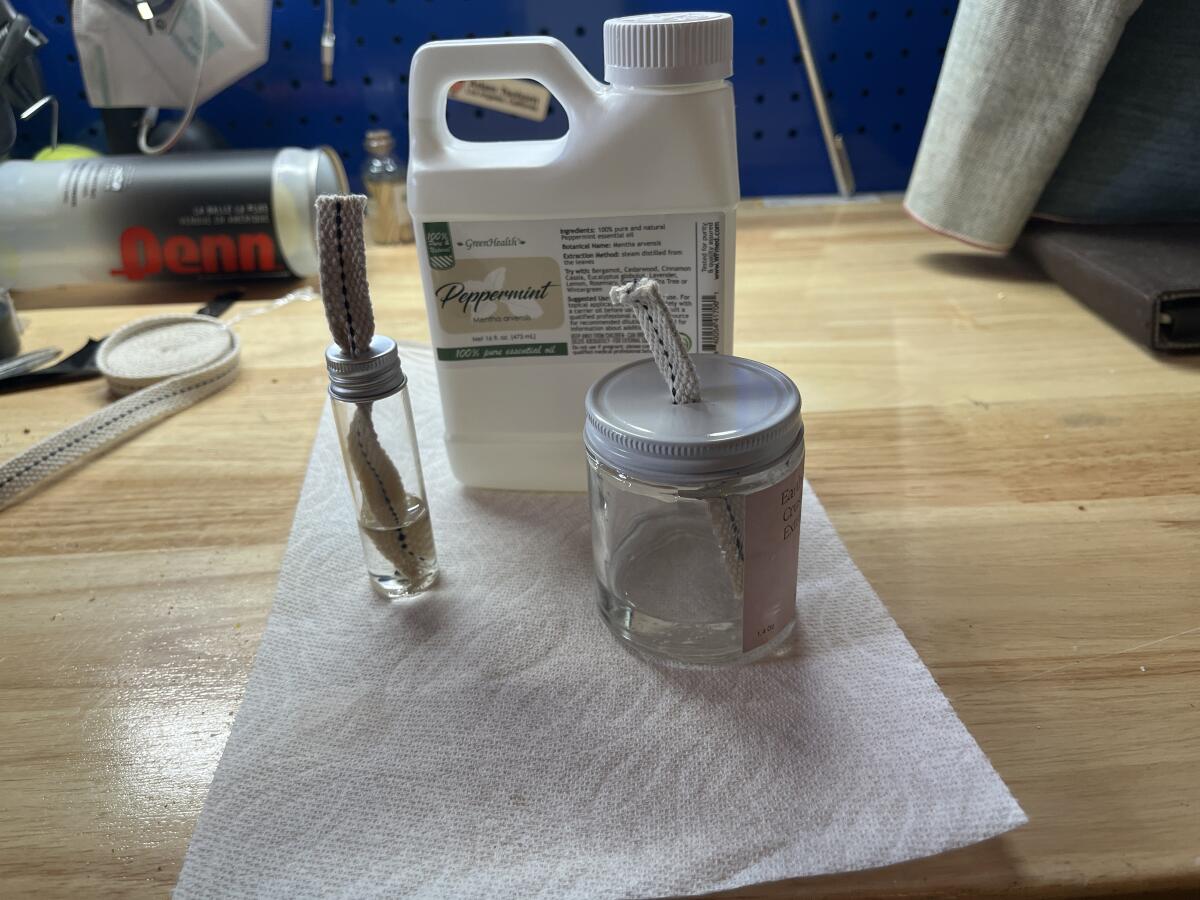[ad_1]
This is the part where I admit two things — neither of which I’m proud of. First, it was only then, several months in, I realized I’d made a colossal blunder when trying to hang my precious high-tech feeder out of squirrels’ reach. I’d measured the recommended five feet off the ground sure enough, but failed to account for the elevation afforded by a nearby tree stump that cut that distance in half. Within 10 minutes of realizing my error, I moved the feeder to a non-stump-adjacent location. Voila! My immediate problem was solved. As of this writing, it’s been 40 days without a squirrel breach.
Second, even though I’d won the battle by accomplishing exactly what I’d set out to do, I refused to give up. I’d waged this war too long and invested too much. How could I sit back when my friend’s guava tree continued to be routinely ransacked and my co-worker’s avocados savaged and tossed to the ground with grubby-pawed abandon?

Peppermint essential oil, first sprayed and later put in jars with cloth wicks around the yard (a suggested hack found online), worked — but only for a short period of time.
(Adam Tschorn / Los Angeles Times)
And worse yet, what if they decided to come for the single — and so far unscathed — orange tree just now starting to show pea-sized fruits in my backyard? No, I needed closure. But before I started investing in owl-shaped, light-up motion sensors (these exist) or blasting C-SPAN across my yard at all hours, I needed someone to tell me if protecting L.A. backyard fruit trees (humanely, remember?) was even possible.
And that’s how I ended up on the phone explaining my situation to Roger Baldwin, a UC Davis Cooperative Extension specialist who focuses on human-wildlife conflict resolution.
“You’ll find various chemical repellents that are marketed and sold [to combat them],” Baldwin told me. “But there’s nothing that’s ever been proven effective against tree squirrels. So I wouldn’t anticipate there being anything that you could spray to really keep them away. [And] there’s no kind of sound devices or ultrasonic devices or lights or strobes — or anything like that — that’s really been proven effective.” (He did note that some repellents might work on a short-term basis until the wily critters adapt.)
“No,” Baldwin said, “there’s nothing that’s guaranteed to work when you’ve got fruit trees, which are an abundant food source, and tree squirrels. … But, like with your bird feeder, if you had an isolated tree — meaning nothing else around for a good 10 feet and nothing overhanging it — and its lowest branches were a good five or six feet off the ground, you could put a metal ring around the trunk to keep them from being able to climb it. But basically this is almost never going to happen.”
He added that even trapping, which might be an option for those willing to consider the squirrel death penalty (in California, the eastern fox squirrel can be trapped and euthanized humanely — but not released elsewhere), would likely be only a temporary solution. “Invariably there’s someone — probably more than one person — on your block feeding squirrels,” he said. “And other squirrels will likely move in. And there’s not much you can do about that. There are too many access points.”
Sensing where things were headed, I cut to the chase. Based on Baldwin’s 16 years of experience, did I have any viable options beyond accepting that my backyard would forever be shared with whatever eastern gray fox squirrels wished to have their run of it?
“There’s probably not a lot that can be done to keep the squirrels from the fruit and the trees given the different limitations that you’ve discussed,” he said. “Yes, it’s more about realistically just learning to live with the squirrels.”
Perhaps sensing my dismay, Baldwin offered a tiny glimmer of hope.
“Sometimes, if you’ve got a very aggressive dog in your backyard — one that can chase squirrels effectively — that can sometimes help reduce problems,” he said.
We’re a dogless household, and the notion of getting a dog just to vanquish a squirrel (or three) felt wrong. (I’m sure our two cats would agree.) So I’m accepting defeat on that front and keeping my focus on the no-longer-under-attack bird feeder.
But so help me, the minute one of those hairy little heathens helps itself to the fruit of my orange tree, the phrase “dogs of war” is going to take on a whole new meaning on my backyard battlefield.
[ad_2]
Source link